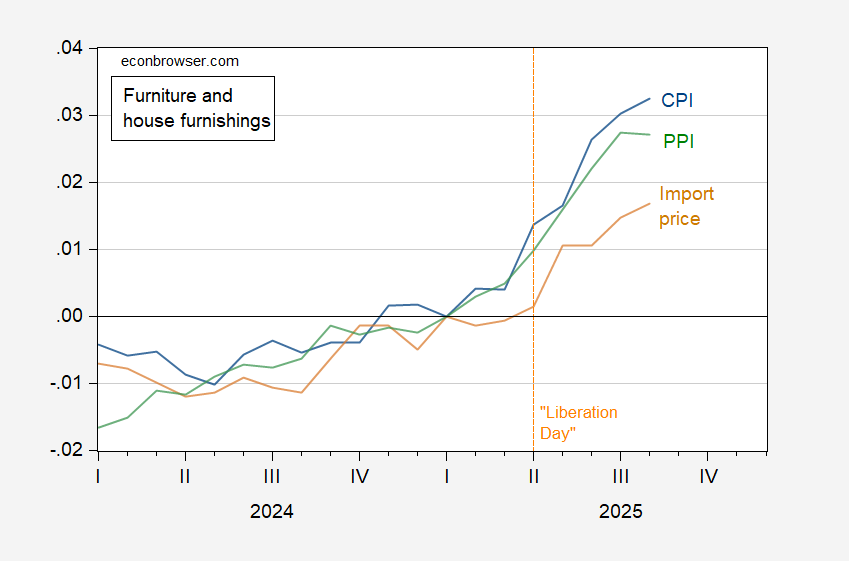The President invokes Section 232 for national security tariffs. From NYT:
United States would begin imposing a 50 percent tariff on imported kitchen cabinets, bathroom vanities and associated products, along with a 30 percent tariff on imported upholstered furniture…
…
The tariffs will be issued under a provision of a national security law, known as Section 232
Another 30% tariff on furniture, where prices have already leapt (relative to import prices) since April 2024.
Figure 1: Furniture and household furnishings component of CPI (blue), of PPI (green), import price index for furniture and household furnishings (tan), all in logs 2025M04=0. PPI seasonally adjusted using geometric moving average. Source: BLS via FRED.
Consumer prices have already 1.5% percentage points more than import prices.

They don’t bother to lie badly anymore. I suppose that’s the final humiliation.
The safety of the nation depends on having a robust industrial base that insulates us from outside coercion, provides a solid employment and tax structure that keeps the nation strong in peacetime, and can be redirected to support military requirements if the need arises.
The US didnt win WWII because it had a robust tank or warship industry in the 1930s, but because it had robust automotive and cargoship industries that could be transitioned to war work.
MatthewK: What’s the strong industrial base needed for warfighting that is associated with bathroom vanity production. Or with upholstered furniture.
Repost:
In WWII, furniture manufacturers were a source factories and skilled labor to churn out munitions. Folks who work in one application with tubular metal can very often swap to some other tubular metal (like say mass producing shell casings). Folks who work with tight tolerance upholstery have machines and people that were repurposable for parachutes.
If you are talking preparedness for a prolonged peer conflict, end products mean nothing and industrial process means everything. Maybe somebody makes a bunch of 3D printed custom boomerangs with aerodynamic profiles in peacetime, but come war they suddenly become a massive player in the drone rotor market.
Of course, the problem with the national security repurposing argument is that it stretches to anything and everything. Watchmakers held that their skills would be exceedingly important for conflicts where precise manipulation of components would be needed for munition and instrument assembly (something for which I believe they were never used after WWII).
Ideally, you’d have somebody in the military running periodic drills to see which capabilities would be hardest to surge in the event of conflict (e.g. injection molding, steel stamping, precision fabric stitching, electronics wiring) and make a call about how much it is worth to fund such capabilities to retain them. And for constitutional reasons I would greatly prefer if there were all enacted under law by Congress.
But the reality is that furniture, like any other manufactured item, has some processes that are useful to armament and munition production. Maybe the cost is not worth the gain (I have no idea), but in 1941 they passed that test handily.
Because if we want to have options in between we let China do whatever to whomever or we let the nukes fly … sustained conflict likely means a WWII level mobilization, and we may be doing it with the oceans interdicted to civilian shipping by autonomous drones.
I think Trump is wrong here and his motives are just his general preference for tariffs. But the stuff that was or could be useful for warfighting is not going to be limited by end product.